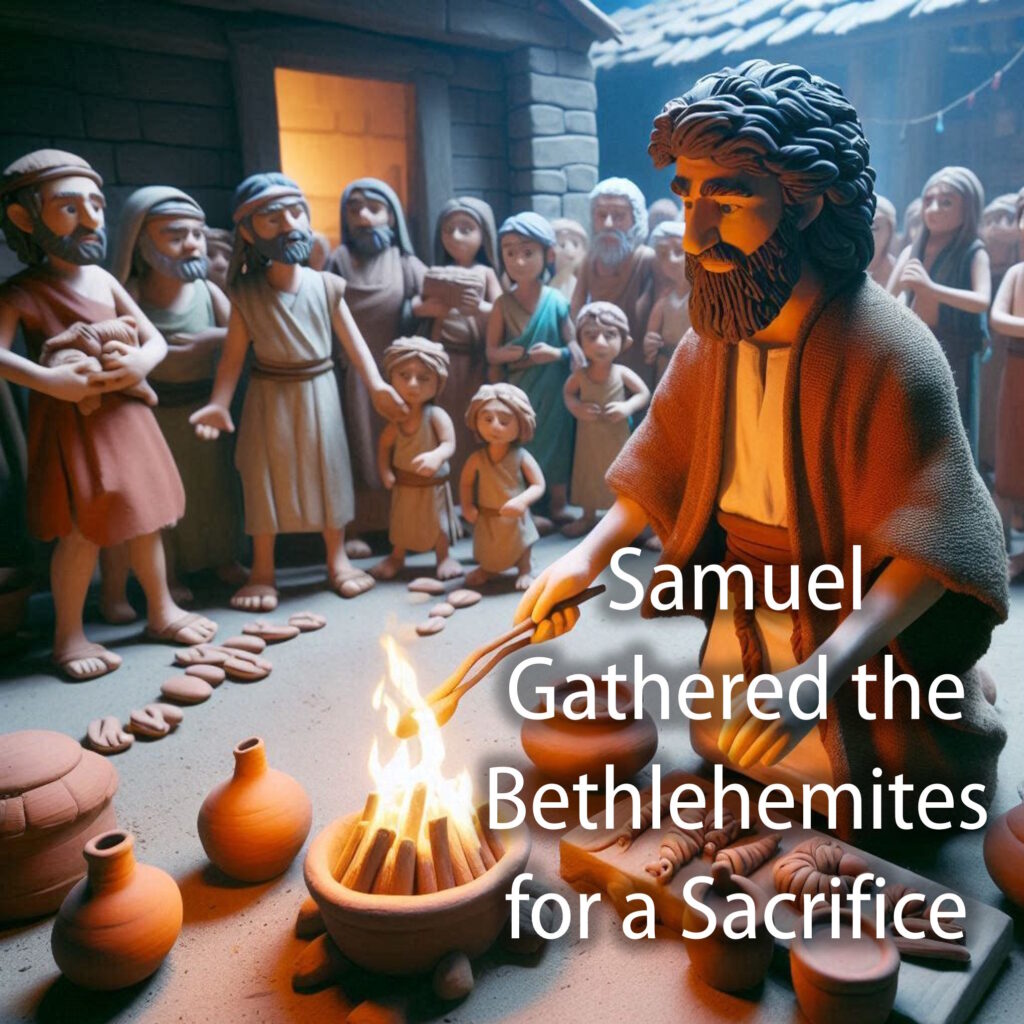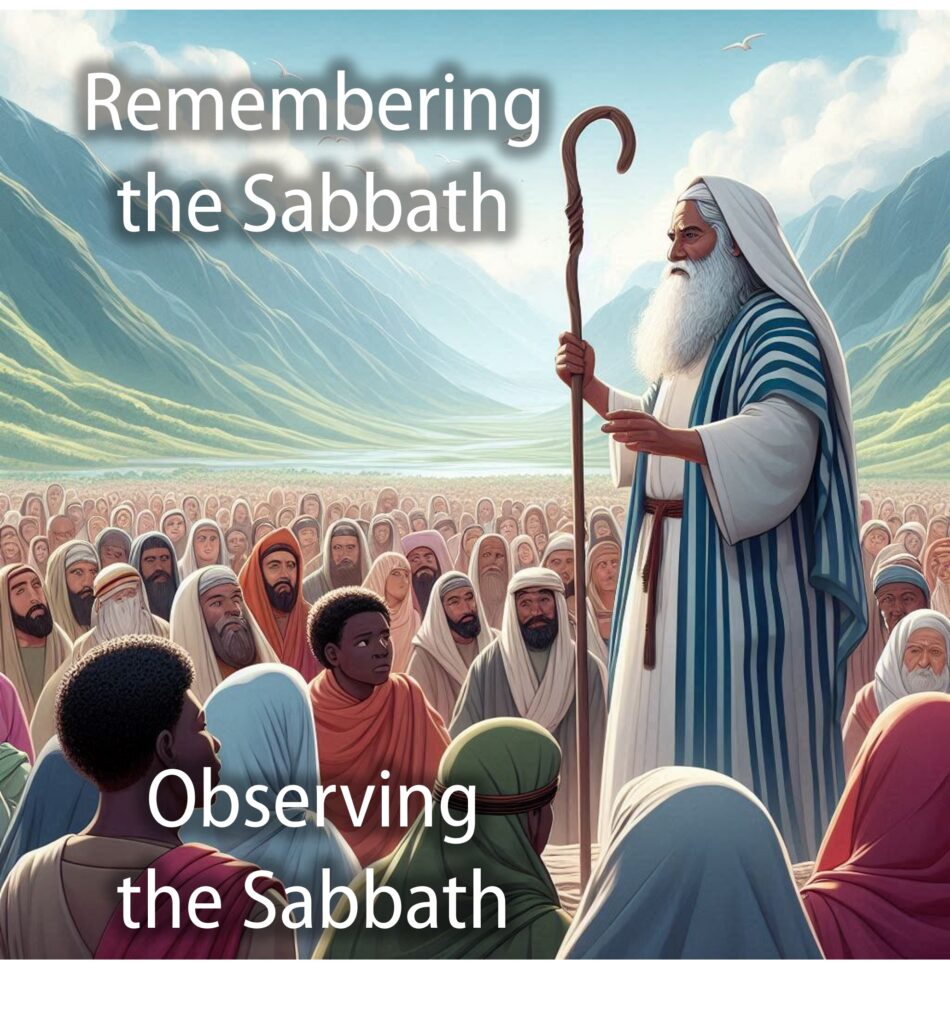Hespeler, June 16, 2024 © Scott McAndless – Fourth Sunday after Pentecost
1 Samuel 15:34-16:13, Psalm 20, 2 Corinthians 5:6-17, Mark 4:26-34
I don’t expect you to remember this but, three years ago I preached a sermon on the story that we read this morning from the Book of Samuel. And I focused on the part near the beginning where it says that, “Samuel grieved over Saul.” It was a verse that seemed to speak to us pretty directly where we were three years ago. We were looking at change, which seems to be a constant in the world these days, and recognizing that the church was going to need to embrace change if we were going to find a place in the world moving forward.
Feeling Optimistic
And I will confess that I was feeling a bit optimistic about change way back then. We were, you will recall, still in the middle of a pandemic, but signs of hope were surfacing. New vaccinations had been approved and we were just getting to the tipping point where a majority of Canadians were going to be protected. There was a lot of goodwill being expressed about scientific research, healthcare professionals and front-line workers.
It seemed possible that this crisis would lead us towards a better society overall with renewed confidence in truth and science and a new respect for the work of those traditionally paid low wages. In many ways it felt as if we were all about to come together and sing “kumbaya” in sweet harmony.
And in that optimistic spirit, I imagined that the greatest impediment to the church embracing the change that was needed was nostalgia. We, like Samuel, were so busy grieving for the glorious lost past of the church that we couldn’t even bring ourselves to think about what could be different.
Was it Just About Samuel’s Grief?
And so, I imagined Samuel’s grief as nostalgia for the “good old days” with King Saul. He was sitting around remembering all of the wonderful battles, the blood and guts and gore. He was sighing over how good Saul looked in his armour and how tall he had been. He was stuck in the past and God had to push him to let go of all of that before he could even think of going out to find someone else to anoint as king.
In the same way, I suggested, all that the church needed to do was let go of its attachment to the past and, as God says to Samuel, “fill your horn with oil and set out” to anoint the new future that God was calling us to.
Things Feel Different
As I return to this story today, though, I am not sure that I am feeling quite as optimistic. That good will that I was hoping for, didn’t quite materialize. Far from coming together to meet the challenges of the moment, we seem to have fragmented as a society over the last few years.
What’s more, the statistics have come in from the pandemic and it has been confirmed that our statements about valuing front-line workers and healthcare professionals were meaningless. The only people who saw their situation improve through the pandemic turn out to be those who were already rich when it started. The only change we seem to have seen has been doubling down on how things have always been.
Maybe I’m a bit more pessimistic, but as I revisit this story today, I notice something. It is not just Samuel’s nostalgia and sentimentality about the good old days with Saul that are in the way of the change that needs to happen. There is something much more sinister. There are indeed powerful and dangerous forces at work that are arrayed against what needs to happen.
Saul’s Power and Privilege
And so, Samuel feels extremely threatened. When God tells him to go out and anoint a new king, Samuel protests. “How can I go?” he says, “If Saul hears of it, he will kill me.” This indicates that Saul is aware that Samuel is a threat to his rule. Samuel is being watched and if he makes an open move that even suggests that he might be considering replacing Saul with somebody else, there is a very real threat of violence. Samuel knows this, and he is not the only one.
When Samuel travels to Bethlehem to secretly choose a successor to Saul, the local elders also understand the threat. “The elders of the city came to meet him trembling and said, “Do you come peaceably?” Why are they trembling? Obviously because, though they might not know exactly what it is, they also recognize that Samuel is trying to change something, and that Saul is going to resist any change with violence.
Violent Resistance to Change
That is why I think it is very important to recognize that change – even positive change – is not only resisted passively with nostalgia and people not wanting to let go of the familiar. It will absolutely be resisted actively with anger and even violence.
And the reason why is obvious. Saul doesn’t want things to change because, the way things are, he gets the power and the privilege. He can set up the monarchy to run in a way that benefits him and his family. He naturally sees change as a threat to his power and privilege and so will use his power and privilege to prevent it.
Now, I don’t mean to suggest that every powerful and wealthy person will always use their power in corrupt ways. There are exceptions, wonderful people who have used their privilege to create a better world that did not necessarily benefit themselves. But such people are rare enough that we should hardly be surprised when the opposite happens.
The Need to be Wary
That is why, when we are living in times when change is in the air, we need to be wary and ready. We need to be asking who has something to lose in the change and, if they have power or influence, we need to be ready for when they choose to use it.
As I said, change did seem to be very much in the air in the early days of the pandemic. The recognition of the importance of low-wages workers, the admission that income support could be a good thing, the realization that the health of the poor and marginalized could affect the health of everyone else all strongly suggested that things had to change.
So why didn’t things change? Why, a few years later, is everything not just back to the way it was but we’ve even seen the wealth gap between the rich and the poor grow dramatically? More and more people all the time are slipping through the cracks in the economy. Do you think that that just happened by accident? I suspect that it had more than a little to do with the powerful in our society flexing their muscles and intentionally taking society to where they felt that it should be.
God Comes Up with a Plan
Embracing change, it turns out, is about more than just our unwillingness to let go of how things used to be. But that does not mean that we should give up hope for change; it just means that we need to do a bit more of the right kind of work for it. After all, when Samuel reminds God of what he is up against, God doesn’t just reply, “Oh, okay, never mind.” God comes up with a plan that we ought to pay attention to. “And the Lord said, ‘Take a heifer with you and say, “I have come to sacrifice to the Lord.”’”
Now, to be clear, God is not sending Samuel to Bethlehem because God desires a sacrifice. It is a ruse. But it is an intelligent one. Saul doesn’t want Samuel going around anointing kings, but Samuel knows that Saul would never prevent him from performing sacrifices. That is kind of the opposite of Samuel fomenting change. Samuel is falling back into his traditional prophetic role which is to support the status quo by keeping God happy.
But even as Samuel falls into his traditional and non-threatening role, he is doing it in a way that will bring about new connections. “Invite Jesse to the sacrifice,” God says, “and I will show you what you shall do, and you shall anoint for me the one whom I name to you.”
Samuel’s Sacrifice

So, this is what Samuel does. He convenes all the families of Bethlehem – including, of course, the family of Jesse that he is particularly interested in. And note how he takes particular care to make sure that everyone is there including seemingly insignificant people like the youngest son of Jesse. That is because Samuel needs to take advantage of the one thing that could possibly counter the power that Saul has. Only by people joining together in solidarity and mutual care can we find the way of defeating the malicious powers of this world. So, Samuel uses the unique ability and privilege he has as a prophet to gather people around a sacrifice.
This is symbolic of the power that we have as the church. I am fairly certain that God never really cared about animal sacrifices. Why would the creator of the universe need such things? But God has always understood both the human need to find connection in community and the power that is inherent in that. And so the sacrifice of animals was always an excuse to gather people together and make connections.
We may not slaughter animals anymore as part of our religious practice – something that I must say that I am very glad about. I mean, can you imagine some of the classes I would have had to sit though in seminary to prepare for that? But we, like Samuel, do have the privilege in our society of bringing people together around acts of worship and it is time for us to recognize that there is power to bring about change in that.
This is the secret that the wealthy and the powerful don’t want anyone to find out about. Their kryptonite, the one thing that can defeat them, is the power of the people united. And, honestly, that is precisely why the powerful few have lately been able to control the agenda of our society so overwhelmingly. They have somehow managed to keep people divided.
A Divided Society
As you have probably noticed, the deep divisions that separate us from one another have particularly contributed to our malaise as a society of late. We have become increasingly fragmented over politics, over public health issues, over news sources or, as Christians, differences in interpretation and biblical application.
It is not just that we disagree about such things – disagreement is a healthy thing. It is that we come to the place where we no longer see the people who are on the other side of the disagreement as worthy conversation partners. We see them as nothing but enemies or heretics. I imagine that things were much the same in Saul’s kingdom. Despotic rulers and wannabe dictators have a way of fostering such a state of affairs.
But Samuel found a way to begin to break that down – to gather people together in a way that transcended the differences. He used an act of worship to do that. I think that there is untapped potential in that the church today needs to embrace.
The Power in Gathering in Worship
I am not going to pretend for a minute that everyone who enters this worship space agrees on their view of God or of what exactly God wants from us. I don’t think we are all on precisely the same page in our understanding of major issues like climate, health or inclusion policies. I really don’t expect us to agree on politics. But somehow, we are here. We are gathered to worship one God, trusting in one saviour and gathered around one table. That unity in diversity doesn’t seem to happen in too many places in society today. But it happens here. That is one of the unique powers of religion when it is done well, it can bring a great diversity of people together.
And if Samuel could harness that possibility and begin a change that would challenge the power of Saul, why couldn’t we? There are powerful forces at work in our world that are preventing positive change both for the society and for the church. I believe that we can be part of challenging those powers if only we use our common devotion to create the sense of unity that is necessary.
I think of this especially in terms of our experiment this summer. Over the next couple of months, we will be gathering with Christians that we do not know. We will be gathering in acts of worship. That is what Samuel did when he went to Bethlehem. Can we do it with the same expectation that Samuel had that God will use such gatherings to show us a new way forward in some new kind of unity? I am engaging in this summer experiment with a heart full of just such an expectation. I hope you will too.

